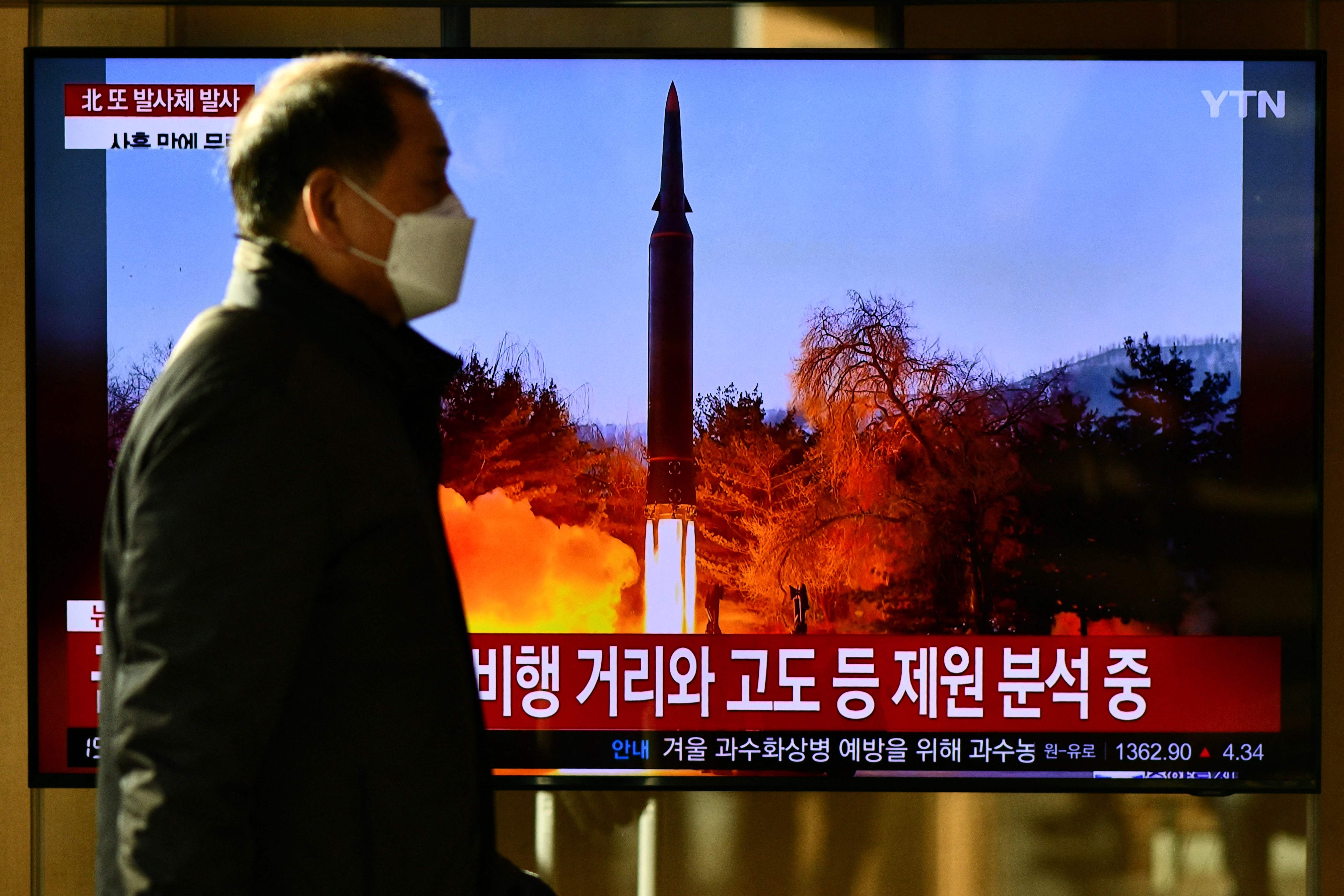North Korea fires missiles hours after criticising US push for new sanctions over its missile launches
The North has conducted seven missile tests since September after a six-month hiatus

Your support helps us to tell the story
From reproductive rights to climate change to Big Tech, The Independent is on the ground when the story is developing. Whether it's investigating the financials of Elon Musk's pro-Trump PAC or producing our latest documentary, 'The A Word', which shines a light on the American women fighting for reproductive rights, we know how important it is to parse out the facts from the messaging.
At such a critical moment in US history, we need reporters on the ground. Your donation allows us to keep sending journalists to speak to both sides of the story.
The Independent is trusted by Americans across the entire political spectrum. And unlike many other quality news outlets, we choose not to lock Americans out of our reporting and analysis with paywalls. We believe quality journalism should be available to everyone, paid for by those who can afford it.
Your support makes all the difference.North Korea launched two ballistic missiles on Friday, the country’s third missile test in the first month of the new year, which came just hours after it threatened a “stronger reaction” to fresh sanctions from the US.
The South Korean military’s joint chief of staff said it believed Pyongyang fired two short-range ballistic missiles (SRBMs) one after the other at 2.41pm and 2.52pm KST (5.52am GMT).
The missile flew northeast from Uiju, located near the country’s west coast border with China, at approximately 430 km, the South Korean military said.
The launch comes shortly after Pyongyang attacked the Joe Biden administration in a sharp response for issuing fresh sanctions and pushing the UN security council for tougher actions against the country.
The country’s leader, Kim Jong-un, has pledged to further expand its arsenal and military power.
North Korea warned the US that its confrontational stance would warrant a “stronger and certain reaction” and defended the series of tests using the oft-repeated claim of exercising its right to self defence.
“The US is intentionally escalating the situation even with the activation of independent sanctions, not content with referring the DPRK’s [Democratic People’s Republic of Korea, North Korea’s formal name] just activity to the UN Security Council,” the spokesperson said.
“This shows that though the present US administration is trumpeting about diplomacy and dialogue, it is still engrossed in its policy for isolating and stifling the DPRK … If the US adopts such a confrontational stance, the DPRK will be forced to take stronger and certain reaction to it,” the spokesperson said.
The launch was also detected by Japan’s coast guards, who issued a safety advisory after reporting the ballistic missile test.
The weapons appeared to have landed in the sea outside Japan’s exclusive economic zone, broadcaster NHK reported, citing Japan’s defence ministry official.
Leif-Eric Easley, a professor at Ewha University in Seoul, said: “North Korea claims its missile tests are efforts at self-defence, are not destabilising, and should not be targeted by economic sanctions.
“But Pyongyang’s rhetoric is dubious because it projects onto other countries what it is actually guilty of: threats to national sovereignty, challenges to regional stability and violations of international law.”
South Korean analyst Kim Dong-yup told Reuters that the North could have possibly fired previously deployed SRBMs like the KN-23 or KN-24.
“It could fit in their ongoing winter exercises, while sending a message to the United States through action following the state media statement,” Mr Kim, a former South Korean Navy officer, said.
On Wednesday, the Biden administration imposed sanctions on six North Koreans, one Russian and a Russian firm identified as Parsek LLC, for their alleged roles in helping the country procure goods for the test launches from Russia and China.
It also pushed the UN Security Council for tougher sanctions against those North Korean individuals and entities accused of violating security council resolutions.
The sanctions came after North Korea restarted its missile testing efforts after a six-month hiatus by testing seven missiles since September. These include Friday’s launch.
The tests include a long-range strategic cruise missile, two ballistic missile tests and a mini submarine-launched ballistic missile. They were followed by two hypersonic ballistic missiles tests this month with gliding warheads.
All the tests violated the US Security Council resolutions that ban the country from developing or testing ballistic or nuclear weapons.
North Korea, however, defends the actions in what it calls its preparation to defend itself against threats from western countries.
US secretary of state Antony Blinken called the North’s latest series of tests “profoundly destabilising” and reiterated that the US was deeply engaged at the UN and with other key partners and allies South Korea and Japan.
“I think some of this is North Korea trying to get attention. It’s done that in the past. It’ll probably continue to do that,” Mr Blinken said.
“But we are very focused with allies and partners in making sure that they and we are properly defended and that there are repercussions, consequences for these actions by North Korea.”
Join our commenting forum
Join thought-provoking conversations, follow other Independent readers and see their replies
Comments